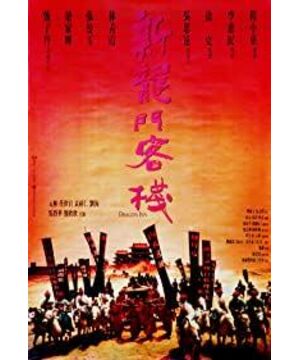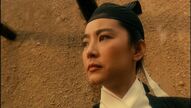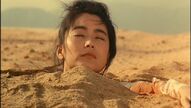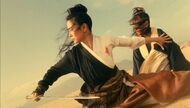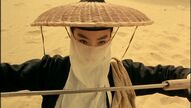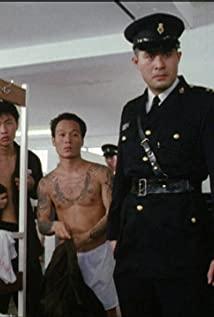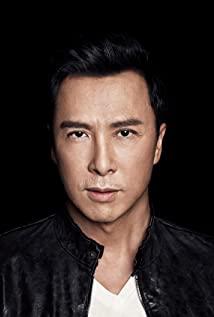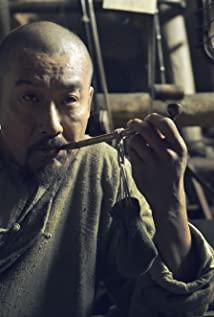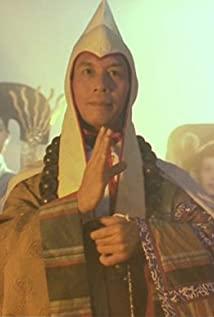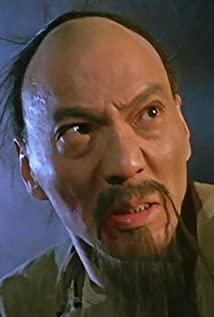Zha Liangyong, a native of Haining, Zhejiang, started writing martial arts novels in Hong Kong under the pseudonym Jin Yong in the 1950s and 1960s.
In Jin Yong's novels, the characters travel all over the country, and there are many places he has never been to.
Jin Yong, who is far away from his hometown, is not only thinking about the tide of Qiantang River in Haining. Scenes such as Wranglers outside the Great Wall and Huashan comparing swords also appeared in his mind from time to time.
In the first martial arts novel, "The Book and Sword", he arranged the most unforgettable encounter between the hero and heroine in the vast Huijiang at the foot of the Tianshan Mountains.
He had never been to the desert, but he was obsessed with such wonders.
Coincidentally, Liang Yusheng, a martial arts novelist as famous as Jin Yong, also likes to write border stories.
"Tianshan Swordsman" later became an important symbol of Liang Yusheng's martial arts.
The literati on Hong Kong Island looked at their home and country in the north at that time, and wrote their thoughts with their pen. There was a boundless loneliness of "who would have expected this life, the heart is in the Tianshan Mountains, and the old Cangzhou".
Perhaps since then, Hong Kong culture has been branded as an "isolated island".
Taiwan is an "orphan of Asia", so why not Hong Kong?
Before 1997, Hong Kong could not see its own historical destiny, let alone its own personal destiny.
This cultural loneliness and loneliness and the fighting spirit of "Under the Lion Rock" have jointly shaped Hong Kong's culture and nurtured a unique martial arts spirit.
In the martial arts novels of Jin Yong and others, what we see is not only the grievances of the rivers and lakes and the love between children, but also a call from the "isolated island", they are calling for the return of some ancient "morality".
Its form name is "Wu", and its god is "Xia".
From the beginning of its prosperity, Hong Kong movies have been inseparable from the martial arts culture.
From Zhang Che, Hu Jinquan, Chu Yuan to Tsui Hark, Cheng Xiaodong, Yuan Heping, it can be said that in the heart of every Hong Kong director, there is a world of martial arts.
For the generation of fans born in the 1980s and 1990s, Tsui Hark's martial arts films had the greatest impact.
Now when I talk about martial arts, when it comes to rivers and lakes, I will instantly think of an inn in the long yellow sand. There lived a coquettish and charming proprietress. She hummed a little song in the moonlight, waiting for a passerby to stop for her. .
In 1992, "New Dragon Inn", which was produced by director Li Huimin and directed by Tsui Hark, is undoubtedly an indelible mark of martial arts in the hearts of a generation.
I don't want to mention any more official evaluations like "Founding a School" and "Monument", but if I could only recommend one martial arts movie, I would definitely choose it without hesitation.
"New Dragon Inn" does not belong to any one of Jin Guliang and Wen, but it is enough to carry the martial arts culture and can also represent Hong Kong movies.
From the script to the scene, from the characters to the action, every part of this movie is "right", so people can't pick out any mistakes, so the look and feel of the film is also "right", and anyone who has watched it has to Say something:
It's actually martial arts.
"Martial arts" is a very abstract concept, and it should be more realistic to say "Jianghu".
The so-called "people are in the rivers and lakes", without all kinds of people, of course there will be no rivers and lakes.
The portrayal of characters in "New Dragon Inn" has reached the extreme.
From the protagonist to the supporting roles, all of them are flesh and blood, and they can stand up to all kinds of pondering.
John Woo said that among Hong Kong directors Tsui Hark "is the best at filming women", and what he said is true.
The two female characters in "New Dragon Inn" are just the best interpretation of "Martial Arts".
Ren Daojian has no eyes and is ruthless in the desert, his children are still in love, and the beauty is on the side of the water.
Who can forget the innkeeper's wife named Jin Xiangyu?
Among the countless classic roles played by Maggie Cheung in her life, Jin Xiangyu is still a standout.
Her character can't be described as "bright", "fresh" is better.
Maggie Cheung brought the coquettish, daring to love and hate gold inlaid jade to life.
From words to behavior, even the hidden weapons used in killing people are very appropriate.
"Jin Bishenghuiyu Linglong", this character set the tone for the whole movie as soon as it appeared:
Changeable and strange, the style is neat and happy.
Even one ounce of appearance or one ounce of acting skills will not have that effect.
The other woman in the film is no less.
Qiu Moyan played by Brigitte Lin is also an unforgettable character.
If gold inlaid jade is fire, Qiu Moyan is water.
Qiu Moyan appeared in men's clothes, but he had a girlish mood in his heart. She acts as a hero for the country and the people, but she also misses her lover Zhou Huai'an's feelings for her in her heart.
Qiu Moyan, who looks cold and reserved, is actually warm and delicate. The plot of her drinking and crying because of Zhou Huai'an and Jin Xiangyu's "fake bridal chamber" is also a very moving design in the film.
The scene where Jin Xiangyu and Qiu Moyan met for the first time and fought in the room for the first time is a classic that is difficult to replicate.
Jin Xiangyu first said to Qiu Moyan:
"I see that you also have two points of beauty."
When the two of you came and went, undressing and dressing, Qiu Moyan had the upper hand, and also praised that gold inlaid jade "has two points of beauty".
The fight between women is not intense, but quite agitated.
Mind blowing.
If the beauty of the world is a total of ten points, Jin Xiangyu and Qiu Moyan in "New Dragon Inn" can each get two points, and the remaining six points can be shared by others.
These two characters went from amazing to classic, probably because of the ending.
Qiu Moyan turned into a fragrant soul in the sand to save Zhou Huaian's death in the desert.
After seeing Dizi again, many fans can recall Qiu Moyan's gaze before his death.
This is "absolute" love.
Jin Xiangyu set fire to the inn after saying goodbye to Zhou Huaian at the end of the film and embarked on a journey to find Zhou Huaian.
This is the "long" love of "I want to force it".
When two women are depicted, the love between children and children is fully depicted.
But that's not all of the arena.
Zhou Huai'an, played by Tony Leung, complements the rivers and lakes.
This elegant, unrestrained and calm knight once lived high in the temple, but in the movie he is far away. For the sake of the righteousness of the family and the country, he can disregard his own safety, and for the sake of righteous people, he can muster his courage.
Seeing such a character, we will think of many characters in the martial arts world.
It is Guo Jing and his wife, who are guarding Xiangyang, and Xiao Feng, who committed suicide at Yanmen.
For a moment, in them we will understand the true meaning of martial arts.
The role of Zhou Huaian not only carries the spirit of "scholar", but also carries the chivalrous feelings of "serving the country and the people".
He's not just a man, he's a man.
At the end of the film, Zhou Huaian told Jin Xiangyu:
"I don't have the courage to face this desert like you do."
With a single line, the words are full and the meaning is endless, and the film is "completed".
Now when I recall "New Dragon Inn", I can still find infinite beauty.
Take action scenes as an example, director Cheng Xiaodong's design is very ingenious.
At the end of the film, Zhou Huai'an and others had a decisive battle with Dongchang Factory. Donnie Yen, who played the factory master, was unbeatable. Seeing that several protagonists were about to be wiped out, the situation suddenly changed.
With a sharp knife, we can only see the shadow but not the person. After three or two strokes, we saw Donnie Yen's hands and feet were cut into bloody bones.
How bizarre, how genius!
Old Monster Xu and Cheng Xiaodong are a match made in heaven.
In the same year, the pair collaborated on "Swordsman: The Undefeated in the East", and also completed another interpretation of "Martial Arts" by Hong Kong filmmakers with a unique adaptation style.
I have mentioned more than once the scene of Lin Qingxia drinking in the film. In my opinion, it is not just a movie shot, but also a cultural symbol, a totem for movie fans and martial arts fans.
The Hong Kong martial arts movies of that era always had an inexplicable magic that could fascinate the audience.
After the passage of time, if we watch those movies again, we may feel that the technology is old and the picture is not very clear. Young people will gradually question the aesthetics of the older generation, and the rivers and lakes that stay away from filters may no longer be likable.
But there are still people who like these movies, Maggie Cheung, and Brigitte Lin.
In countless places where there are Chinese, topics such as martial arts, Jianghu, and Jin Yong will still be talked about by people, even if they become no longer mainstream.
So what?
If I don't understand things that are becoming more and more mainstream, I won't criticize people.
But I will think of the sentence in Jin Yong's "White Horse Howling in the West Wind":
"Those are all very good, but I just don't like them."
With this article, I wish Mr. Jin Yong his ninety-fourth birthday
View more about Dragon Inn reviews


